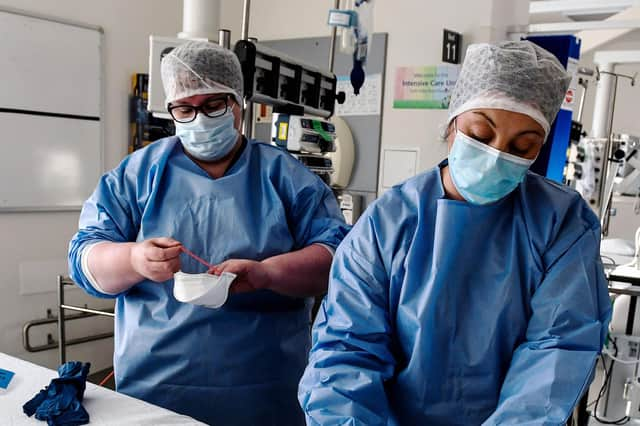'Stretched to the limit' - doctors quitting as Covid-19 increases burnout, union warns


A survey by the union of 261 consultants showed that almost half were considering retirement in the next five years, with more than half of those saying this would mean leaving earlier than their pension age.
BMA Scotland said recent exhaustion and pressure during the pandemic had added to existing problems – one in five consultants aged 45-49 in 2010 had left the profession by 2020 based on analysis of workforce data, with early retirement being the most likely destination.
Advertisement
Hide AdAdvertisement
Hide AdDr Graeme Eunson, chair of the BMA’s Scottish Consultants Committee, said staff had been “stretched to the limit” over the past year, and warned staff shortages are already affecting the ability of doctors to deliver patient care.


He said: “Staff are exhausted: from a hard winter in 2019 straight into the Covid-19 pandemic early last year, with no time to recover between the first and second waves, they are now running on empty. Doctors had been reporting widespread burnout and an array or workforce and workplace pressures long before the pandemic hit last year."
He added: “The impact of the Covid-19 pandemic on their mental and physical wellbeing is such that many feel the only way they can recover is to significantly cut their hours or leave the profession altogether.”
Dr Eunson called for “urgent and enduring action” to address the problem.
“I cannot be any clearer when I say that in order for our NHS to recover, our staff must recover first,” he said, adding that there must be focus on recruitment and retention, better work-life balance, and steps to improve the working culture within the NHS.
Vanessa Mackay, clinical lead in obstetrics and gynaecology at Queen Elizabeth University Hospital in Glasgow, said there is a “very real potential” of staffing issues after the pandemic.
“We now have a significant surgical backlog and our waiting list is growing – and then there are routine follow-ups too,” she said.
She added: "I think we have a very long road ahead of us – no matter what department or format you’re working in, everyone is working differently and therefore it increases our risk of mental health upset, of burnout, and there is also a very real potential for a lack of retention once this is finally over.
Advertisement
Hide AdAdvertisement
Hide Ad“We’re already seeing colleagues who are having to take time off because they’re shielding or because they’re ill and it may be that they expedite their retirement because they’re just not able to commit to the changes being asked of them.”
Rajmohan Padmanabhan, a consultant anaesthetist in NHS Lanarkshire, said his workload increased significantly during the pandemic.
“The pandemic has affected people a lot – it’s changed their viewpoints, and people are realising that life is not all about work,” he said.
"Covid-19 has shown us that life can be very short, and there are doctors and other NHS workers who have been directly affected by it across various specialities. They might be considering what else is out there for them – particularly if the government and the system
continually fails to recognise their value.
"There’s a misconception that senior doctors are asking for the world: we are not – we’re asking for on-par pay rises, in line with inflation and other recommendations, and for our pensions not to be punitively taxed.
"I think in a few years, if these issues are not rectified, a lot of people in the workforce currently might disappear.”
A spokesperson said the Scottish Government is committed to improving wellbeing for health and social care staff.
“Since 2006 the number of consultants employed by NHS Scotland has increased by over 56 per cent, with a record high of 5,702 whole time equivalent consultants,” they said.
Advertisement
Hide AdAdvertisement
Hide Ad“We are also working to build a sustainable culture that will continue to prioritise staff wellbeing in the future."
A message from the Editor:Thank you for reading this article. We're more reliant on your support than ever as the shift in consumer habits brought about by coronavirus impacts our advertisers.
If you haven't already, please consider supporting our trusted, fact-checked journalism by taking out a digital subscription.
Comments
Want to join the conversation? Please or to comment on this article.